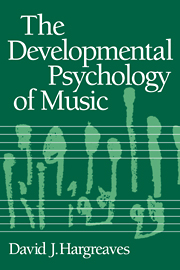Book contents
- Frontmatter
- Contents
- Preface
- 1 The developmental psychology of music
- 2 Children's thinking and musical development
- 3 Musical development in the preschooler
- 4 Musical development in the schoolchild
- 5 Development of responses to music
- 6 Creativity, personality, and musical development
- 7 Social psychology and musical development
- 8 Developmental psychology and music education
- References
- Author Index
- Subject Index
1 - The developmental psychology of music
Published online by Cambridge University Press: 27 August 2009
- Frontmatter
- Contents
- Preface
- 1 The developmental psychology of music
- 2 Children's thinking and musical development
- 3 Musical development in the preschooler
- 4 Musical development in the schoolchild
- 5 Development of responses to music
- 6 Creativity, personality, and musical development
- 7 Social psychology and musical development
- 8 Developmental psychology and music education
- References
- Author Index
- Subject Index
Summary
Introduction
This book is an attempt to define and describe a newly emerging field of study: the developmental psychology of music. It represents the confluence of the disciplines of developmental psychology and music psychology; both of these, of course, constituting parts of the subjects of psychology and music, as well as of education. All these terms are labels of convenience for agreed areas of knowledge. They are to a certain extent arbitrary, and susceptible to change and obsolescence as knowledge advances. It could indeed be argued that this is a good thing, since the imposition of artificial subject boundaries in educational institutions and curricula can often impede the cross-fertilisation of ideas by which any discipline proceeds. I have therefore deliberately cast my net widely: my account will be overinclusive rather than underinclusive.
‘Developmental psychology’ has been virtually synonymous with ‘child development’ for many decades, although the increasing emphasis upon a ‘life-span’ approach (e.g. Ambron and Brodzinsky, 1979) means that behavioural changes in adulthood are now receiving more attention. The research to be described in this book has been carried out on adults, as well as on children and adolescents. ‘Music psychology’ is better thought of as a collection of loosely related topics than as a coherent discipline with any integrated conceptual or empirical framework.
- Type
- Chapter
- Information
- The Developmental Psychology of Music , pp. 1 - 30Publisher: Cambridge University PressPrint publication year: 1986



